A Health Guide: All You Need To Know About Nitric Oxide
Bodybuilders use a variety of supplements to boost their performance and improve their workouts. One of the most common supplements used is a nitric oxide supplement.
Table of Contents
Introduction
Also known as nitrogen monoxide, Nitric Oxide is among the most notable oxides of nitrogen. In chemical studies, it is represented by the chemical formula NO. Nitric oxide is one of the compounds that are essential for the many critical biochemical functions in our body. What exactly are those functions? How is nitric oxide essential for us? Does it have any harmful effects? We’ll discuss all that and more in our comprehensive guide to nitric oxide and its associated products.
But before we go on to analyze what Nitric Oxide actually is, it’s important to distinguish it from what it’s not. Many people seem to confuse nitric oxide, albeit understandably, with another similar-sounding oxide of nitrogen commonly known as nitrous oxide (N2O). Nitric oxide is not the gas used as an anesthetic during your visits to the dentist’s office. It’s not the fabled euphoria-inducing and aptly-named “laughing gas”. Neither is it the substance, commonly known as NOS, which is used as an oxidizer in rocket ships and racecars. Whenever anyone attributes any of those attributes to nitric oxide, what they’re actually thinking about is nitrous oxide. The difference between the two compounds cannot be greater.
With that out of our way, let’s direct the conversation to nitric oxide. In the human body, nitric oxide functions primarily as a cardiovascular signaling molecule. Its discovery was so substantial that it was named the molecule of the year in 1992. Research into the properties of the compound won Robert F. Furchgott, Louis J. Ignarro, and Ferid Murad the Nobel Prize in Physiology and Medicine in 1998.
 So what is it that makes this compound so substantial?
So what is it that makes this compound so substantial?
Under normal circumstances, nitric oxide appears as a colorless, unnoticeable, and a frankly uninteresting gas. However, its unique chemical structure makes it such an attractive option for commercial processes and an essential component in human physiology. Composed of an atom of nitrogen and oxygen each, the molecule is a free radical, which means its structure includes a free-floating unpaired electron. This makes the compound so chemically reactive and a natural fit in various chemical processes of an industrial nature.
 In human beings, it acts as a cellular signaling molecule which makes it a critical component of several biochemical processes. Its most important function is that of a vasodilator. When it’s released in the blood stream, it helps dilate the blood vessels and improve the flow of blood and, by extension, oxygen, to many of the body’s vital organs. It has several cardiovascular benefits, some of which we will discuss in the coming chapters. It is also used as a primary component in dietary supplements for weightlifting and bodybuilding. The production of nitric oxide also impacts the functioning of the liver.
In human beings, it acts as a cellular signaling molecule which makes it a critical component of several biochemical processes. Its most important function is that of a vasodilator. When it’s released in the blood stream, it helps dilate the blood vessels and improve the flow of blood and, by extension, oxygen, to many of the body’s vital organs. It has several cardiovascular benefits, some of which we will discuss in the coming chapters. It is also used as a primary component in dietary supplements for weightlifting and bodybuilding. The production of nitric oxide also impacts the functioning of the liver.
The vasodilation function of the compound makes it an ideal ingredient to treat erectile dysfunctions in substances such as Viagra. It is also critical when it comes to improving the fat metabolism under the conditions of starvation. The medicinal use of nitric oxide also warrants further discussion.
 Common Functions Of Nitric Oxide
Common Functions Of Nitric Oxide
Nitric oxide is critical for some of the most important physiological and biochemical processes in the body. All human activity originates on a cellular and sub-cellular level. And it is at this level that we need to analyze what the effects of nitric oxide can be in terms of regulating our body’s functions.
The signaling function of the molecule makes it ideal for the cell’s memory function. It helps transmit information from and between cells in the brain. It is also essential for our body’s natural immunity, particularly when it comes to battling or preventing the growth and development of tumors.
The vasodilatory function of nitric oxide helps in maintaining a stable blood pressure by dilating blood vessels when needed. The improved blood flow to the body’s muscle is extremely beneficial for increasing endurance and strength through workout and bodybuilding.
That’s not all. The compound is also responsible for many other miscellaneous functions in the body. It helps reduce inflammation and improve the quality and duration of sleep for those with sleep-related issues. It aids the sense of smell and also helps in certain digestive functions.
Some of the functions of the compound merit further and detailed analysis. Let us examine some of those functions here.
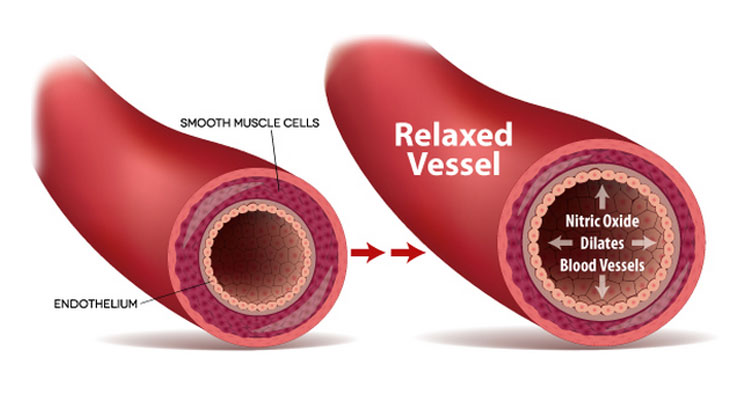 Heart Disease And Other Cardiovascular Functions
Heart Disease And Other Cardiovascular Functions
One of the many medicines suggested by physicians around the world to treat heart conditions is nitroglycerin. For years, the medical community was aware of the benefits of nitroglycerin but didn’t know exactly how the substance helps with heart problems.
Among the people actively wondering about the functions of nitroglycerin associated with heart disease was the founder of the Nobel Prize, Alfred Nobel himself. Around a century ago, he was prescribed nitroglycerin by his doctor to treat his own heart condition. Being the inventor of dynamite, which has nitroglycerin among its many components, Nobel was naturally curious about the role of the substance in treating cardiovascular maladies.
What Nobel didn’t know at the time was that nitroglycerin acts in the body by releasing nitric oxide which, in turn, helps dilate blood vessels. This is particularly helpful in certain cardiovascular disorders since they’re caused by the narrowing of blood vessels resulting in the obstruction of the blood flow or oxygen to the body.
Under normal conditions, nitric oxide is produced naturally within the body by the internal lining of the arteries. However, the buildup of plaque on the arterial surface, or endothelium as it’s commonly known, can severely reduce the production of nitric oxide. The condition is known as atherosclerosis. It is one of the many problems for which physicians prescribe nitroglycerin.
 Bodybuilding And Muscle Growth
Bodybuilding And Muscle Growth
Nitric oxide is becoming increasingly popular with athletes, bodybuilders, and the fitness community. It is used as the primary ingredient in various dietary supplements associated with muscle growth and athletic fitness. To understand the function of nitric oxide in bodybuilding and fitness, we first need to analyze the physiological functions that warrant the use of nitric oxide supplements.
 When an average bodybuilder performs muscle-building exercises, what they’re actually doing is exerting their muscles faster than the capability of the body to supply oxygen to those muscles. The increased activity and the lack of oxygen cause the buildup of lactic acid in the body’s muscles. At the same time, it can also be responsible for reduced nitric oxide levels in the body. This induces the feeling of pain and fatigue that you’re likely to experience after a grueling round of workout. This feeling of pain and stiffness is likely to exist for weeks if you haven’t had exercise in a long time.
When an average bodybuilder performs muscle-building exercises, what they’re actually doing is exerting their muscles faster than the capability of the body to supply oxygen to those muscles. The increased activity and the lack of oxygen cause the buildup of lactic acid in the body’s muscles. At the same time, it can also be responsible for reduced nitric oxide levels in the body. This induces the feeling of pain and fatigue that you’re likely to experience after a grueling round of workout. This feeling of pain and stiffness is likely to exist for weeks if you haven’t had exercise in a long time.
This is precisely the reason why nitric oxide supplements can prove to be quite beneficial for professional athletes and bodybuilders who perform physically exhausting exercise on a daily basis. The dietary supplements with substances like L-citrulline and L-arginine perform two critical functions when it comes to fitness and physical activity.
The first of these functions is the increase in the flow of blood and oxygen to the muscle. Increased blood flow facilitates exercise and reduces some of the negative effects associated with it. The second function associated with these supplements is that they substantially reduce the recovery time after exhaustive exercise by preventing or removing the buildup of lactic acid in the body’s muscles.
 Aging And Other Causes
Aging And Other Causes
As we grow older, the natural production of nitric oxide in the body can reduce, causing several heart-related problems and frequent fatigue and exhaustion. Other causes that affect the production of nitric oxide also include frequent inactivity, regular smoking, high-cholesterol or fatty diets, and unhealthy foods. If you’re suffering from any of these problems, the solution may be nitric oxide supplements which can provide you with additional energy, reduce fatigue, and prevent cardiovascular problems.
However, before you leave for the store to buy the supplement, you need to read about some of the risks that may be associated with the use or misuse of such supplements. For people with blood pressure problems or heart conditions, nitric oxide supplements may be risky. If you suffer from any such problems, remember to consult your physician or healthcare professional.
 Erectile Dysfunction
Erectile Dysfunction
There can be many causes of impotence in men. One of the leading causes of erectile dysfunction is the poor blood supply to the sexual organs. And there are many ways to treat erectile dysfunctions. But the most popular substance used to treat erectile dysfunction or its effects, is Viagra and other similar medications.
The way these medications functions is that they help the release of nitric oxide in the body. This causes vasodilation which improves the flow of blood to the sexual organs resulting in a healthy and sustained erection.
 Benefits Of Nitric Oxide Supplements For Bodybuilders
Benefits Of Nitric Oxide Supplements For Bodybuilders
The feeling of constant pain and fatigue is something a bodybuilder or an athlete must constantly live with. The pain that follows a hard day at the gym can be, at best, annoying and at worst, almost unbearable. Fortunately, there is a solution. You can use a nitric oxide dietary supplement.
With the constantly increasing intensity of your workout routine as you continue to add weights each week, it’s critical that you offer your muscles the time to rest and recuperate from the strenuous activity. But you cannot afford to break up a routine you’ve built over the course of months, sometimes even years. And you shouldn’t. For many bodybuilders, what does the trick in terms of recovery is a healthy shake before or after a workout.
However, if you’re looking to take your workout routine up a notch, a simple protein shake just won’t do. When you dedicate yourself to creating a healthy lifestyle, what you do outside the gym is almost as important as, if not more so than, the exercise you do inside the gym. Health supplements can provide you with the extra energy and enhanced functionality to successfully push your body further than anyone else.
Here are some of the reasons how a dietary supplement with nitric oxide can help you recover and workout more than ever before.
 1. Helps Muscle Recovery Rates
1. Helps Muscle Recovery Rates
We all know that feeling of exhaustion and soreness after a hard workout the day before. Sometimes, your muscles need a few days off from working out to heal and rest but for serious bodybuilders, this isn’t an option. Therefore, they take nitric oxide to help speed up the recovery process.
Nitric oxide helps speed up the recovery process by increasing blood flow to the muscles by helping muscles relax, allowing more oxygen to get to the muscles. Since recovery time is highly dependent on nutrient absorption in the muscles, increasing blood flow is going to help the muscles recovery much more quickly.
 Once you build up a regular workout routine, you simply cannot afford to take a break and rest out for a day or two to lessen the post-workout fatigue before you hit the gym again. You won’t be able to build the necessary momentum to push forward with the level of intensity it takes to see visible results. You might be thinking how you can build that momentum if you’re unable to move your hand, let alone lift a weight, the next day.
Once you build up a regular workout routine, you simply cannot afford to take a break and rest out for a day or two to lessen the post-workout fatigue before you hit the gym again. You won’t be able to build the necessary momentum to push forward with the level of intensity it takes to see visible results. You might be thinking how you can build that momentum if you’re unable to move your hand, let alone lift a weight, the next day.
It’s a valid concern. And there’s an effective solution. Dietary supplements with nitric oxide can help with the recovery time between two sessions of workout. When you feel pain in every muscle in the body after a day at the gym, it is due to the lack of oxygen in your muscles. You’re pushing your body beyond the limits of its normal everyday function and think of it as the price you need to pay.
With a nitric oxide supplement, you can increase the amount of oxygen to your muscle tissues through enhanced blood flow. The blood flow to your muscles is critical when it comes to delivering the right number of nutrients and oxygen so that they can recover to state they were in before the workout. And nitric oxide supplements can help you do just that.
When it comes to body building and workouts, more is usually better. The more you exercise and the bigger weights you use, the better the results would be. One of the goals of building a steady routine is also increasing the frequency of workout sessions. And you cannot achieve that if you feel tired and worked out all the time. There is such a thing as over-training. And it occurs when you try to push your body faster than its ability to recover. And, without recover, no matter how much you train, you won’t be able to achieve the same results. It’s one of the reasons nitric oxide supplements can help you recover in addition to sleep and hydration.
Remember to combine the supplement with a healthy protein shake and a good meal. It would help you achieve the best results. With a few days of use, you’ll begin to see the visible results.
 2. Enhances Endurance During Workouts
2. Enhances Endurance During Workouts
Much like our first benefit, the reason your body starts to fatigue during workouts is because the muscles aren’t getting enough oxygen. Since endurance is heavily dependent on oxygen reaching the muscles, you’re naturally going to have longer stamina because nitric oxide increases blood flow to the muscles.
In addition, nitric oxide will also help prevent you from fatiguing when you’re performing higher repetitions. Higher nitric oxide levels may be the difference between you being able to get those extra two or three reps.
 One of the common misconceptions associated with nitric oxide supplements is that they are only used to boost strength when it comes to muscle training and bodybuilding. That’s not the only function associated with the substance. Another critical function it can perform is the enhancement of endurance for athletes particularly those competing in a distance event, like a marathon or cycling.
One of the common misconceptions associated with nitric oxide supplements is that they are only used to boost strength when it comes to muscle training and bodybuilding. That’s not the only function associated with the substance. Another critical function it can perform is the enhancement of endurance for athletes particularly those competing in a distance event, like a marathon or cycling.
Why do some people get tired easily after a sustained 100-meter run? Admittedly, training helps you develop the levels of endurance required to succeed in competitive events. But training can only take you so far. As you expand your horizons to the limits of human achievement, your body might not be quite so willing. You may perform better than almost everyone else but you might find that you can’t push yourself beyond a certain limit. What’s happening here is that you have limited endurance due to the limited supply of oxygen to your muscle tissues. No matter how much you train your muscles, you cannot change the physiological processes beyond a certain point.
But there is a solution. And it can help you work harder for longer periods of time. Nitric oxide supplements can help boost the supply of blood to your muscles and, as a direct result, enhance the endurance required for extreme athletic abilities.
If you are an athlete training in an area with higher altitudes, nitric oxide supplements might be an unavoidable part of your training regimen. High altitudes are notoriously short in oxygen supply. And that might put you at a disadvantage because you don’t just need oxygen to breathe; you need it to energize your muscles enough to enable you to train with higher levels of efficiency. And when your natural surroundings are of no or little help, you can find solace in supplements with nitric oxide.
 3. Increased Glucose Use
3. Increased Glucose Use
A study published in the American Journal of Endocrinology and Metabolism found that men who took the nitric oxide precursor l-arginine had a higher rate of glucose appearance, disappearance, and clearance.
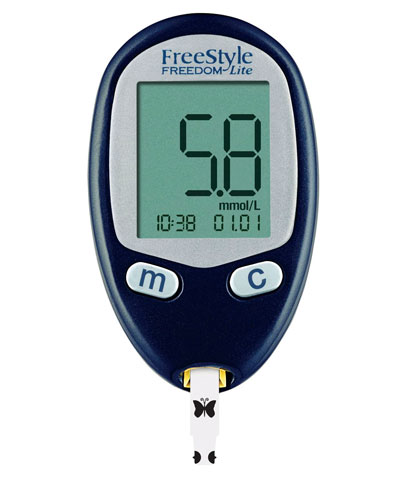 In other words, men who increased their nitric oxide production also increased the amount of fat burned.
In other words, men who increased their nitric oxide production also increased the amount of fat burned.
Gaining muscle mass might not be the reason why you hit the gym in the first place. Your health goal might have been a reduction in body fat due to increased glucose metabolism. And if that’s the reason, then nitric oxide supplements might be the best bet for you.
The presence of L-arginine in the supplements has an impact on higher and faster levels of fat breakdown in the body. When you work out, your body uses up the existing fat which helps you reduce weight. If losing fat is the ultimate goal, those using nitric oxide supplements may be at an advantage.
 Increased Muscle Pump
Increased Muscle Pump
Muscle pump is largely dependent on the amount of blood flow to the muscles and when we lift, blood flow to the muscles is naturally increased. However, taking a nitric oxide supplement will dramatically increase blood flow to the muscles and give you a more pronounce and longer muscle pump.
 The best part about nitric oxide supplements is that they are very safe for the most part. As with any supplement, make sure to inspect the label so you know what the ingredients are in the supplement before you buy it. However, an overwhelming majority of nitric oxide supplements, there are no side effects.
The best part about nitric oxide supplements is that they are very safe for the most part. As with any supplement, make sure to inspect the label so you know what the ingredients are in the supplement before you buy it. However, an overwhelming majority of nitric oxide supplements, there are no side effects.
As you finish your day’s workout and prepare to head home and check your reflection in the mirror, do you appear more buff than usual? That last glance in the mirror is one of the rewards of a hard day’s work. But it may not last long enough for you to impress your friends. A set of tighter and fuller muscles is any bodybuilder’s dream. But how can you achieve that?
The answer is nitric oxide supplements. With the enhanced flow of blood to your muscles, nitric oxide not only helps you achieve a more pronounced post work-out pump, but it also enables the pump to last longer than what you can achieve after a regular workout session.
The post-workout muscle pump has more than just aesthetic appeal. It doesn’t just make you look good after a workout, although that certainly is a benefit. Perhaps even more important function it serves is to motivate you for the coming day. Motivation can be hard to come by, particularly when the goal is to painfully shred your muscles every day. But that one last look in the mirror can do the trick. And if it makes you want to go to the gym regularly, there’s no better reason to use nitric oxide supplements.
 Maintaining Body Temperature
Maintaining Body Temperature
One of the reasons you sweat buckets after a hard day’s work is that increased physical activity raises your body’s temperature significantly and sweating is your body’s attempt to resist the increasing temperature and cool your body down.
Sweating, however, is not the only way your body attempts to revert to natural temperatures. Another way it does that is to increase the levels of blood flow to prevent overheating. As blood pumps at a faster rate in your body, it loses heat and you maintain your body’s core temperature balance. And, as we’ve seen before, one of the effects of nitric oxide is to promote vasodilation and increase the blood flow. So, the nitric oxide supplements can also help you sustain regular body temperature.
Another advantage particularly associated with this function is enhanced energy. As your body scrambles to balance the temperature through increased flow of blood, it spends a lot of energy. This is valuable energy that you might have otherwise utilized during the workout or physical activity. With a nitric oxide supplement, you can increase your blood flow in a more energy efficient manner leaving you with more energy to spend during exercise or a competitive sporting activity.
 Reduced Fatigue
Reduced Fatigue
One of the goals of bodybuilding is to move towards bigger and bigger weights and, at the same time, increase the number of reps on a weekly or daily basis. On paper, it sounds easy enough. As you’re training your body to endure more and more, it should become easier to achieve your bodybuilding goals. But one thing stands in the way of you and success. And that’s fatigue.
 You may come to realize, or you may have realized already, that you’re just too tired to do more reps. Music doesn’t help. Motivation doesn’t work. Your body has simply, for the lack of a better term, given up. You simply can’t do more. Fatigue hangs over your head like a dark cloud. Is there a silver lining? There absolutely is.
You may come to realize, or you may have realized already, that you’re just too tired to do more reps. Music doesn’t help. Motivation doesn’t work. Your body has simply, for the lack of a better term, given up. You simply can’t do more. Fatigue hangs over your head like a dark cloud. Is there a silver lining? There absolutely is.
Fatigue is the result of a buildup of lactic acid in your muscle tissue, a common reaction to increased physical activity. As the oxygen supply to the muscles gets limited due to sustained activity, your muscles begin producing lactic acid which can be quite painful if you continue with the exercise.
The overwhelming burning sensation that causes you to put down a weight is due to the same lactic acid buildup. And putting down the weight is simply not the option if you’re looking to grow and progress faster towards your goals. Therefore, lactic acid supplements are a sensible solution. They enhance the flow of oxygen to your muscles, preventing the buildup of lactic acid and, thus, early exhaustion or fatigue.

How To Naturally Boost Nitric Oxide Levels In The Body
There is no doubt that health supplements designed to boost nitric oxide production in the body are quite effective. And, in the back of your mind, taking a nitric oxide supplement might seem like an easy option. However, a serious commitment to this cause would require you not just to spend money on supplements but also a corresponding change in lifestyle.
Whether or not you plan to take nitric oxide supplements, you need to start thinking about ways to naturally boost nitric oxide levels in the body. For those who want to stay away from supplements, what better way to benefit from the increased NO levels than to make a few critical lifestyle changes? And even if you are a supplement person yourself, you need to, well, supplement those efforts with some of your own so that you don’t depend entirely on external sources for greater nitric oxide concentrations.
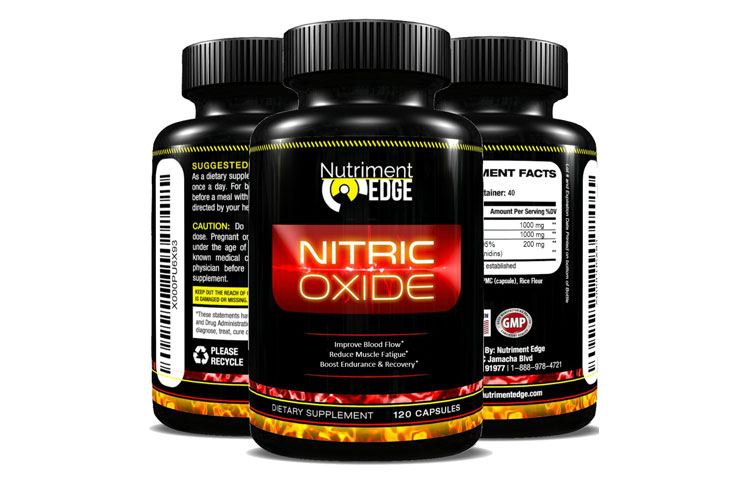 What Difference Would It Make?
What Difference Would It Make?
Most of the health effects of nitric oxide are not quite well known. The substance itself doesn’t seem to get the attention it deserves. And we don’t have the time or the energy to go into the details of why that might be. What we do know, however, is that a lot of people are woefully unaware of the effects of increased nitric oxide levels in the body and how beneficial the substance really is.
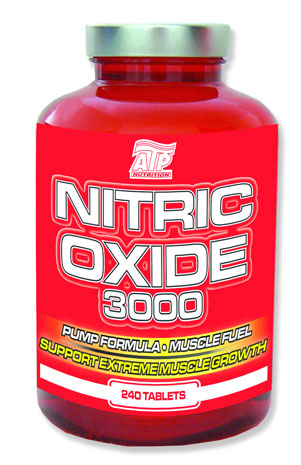 We’ve already had an extensive discussion on the health benefits of nitric oxide. To summarize it in a few words, increased nitric oxide levels in the body can help you in three key ways. First, you can substantially reduce the risk of cardiovascular diseases and other associated problems. Second, it leads to an improved sexual experience. Why rely on Viagra when you can enhance your sexual performance naturally? Thirdly, and perhaps the most noticeable difference nitric oxide can make, is that it can help you exercise better. And it is this particular reason which would attract the attention of the bodybuilding and fitness community.
We’ve already had an extensive discussion on the health benefits of nitric oxide. To summarize it in a few words, increased nitric oxide levels in the body can help you in three key ways. First, you can substantially reduce the risk of cardiovascular diseases and other associated problems. Second, it leads to an improved sexual experience. Why rely on Viagra when you can enhance your sexual performance naturally? Thirdly, and perhaps the most noticeable difference nitric oxide can make, is that it can help you exercise better. And it is this particular reason which would attract the attention of the bodybuilding and fitness community.
If you consider yourself a member of the community, you’d know better than anyone else how hard it is to achieve your fitness goals. For a start, you have to work out regularly. But that’s not it. You have to constantly and consistently push yourself to achieve more and more. You have to push your body past endurance. You have to work harder each day and just not stop in the way.
But many of you know that, despite how hard you work and how grueling your workout routine is, there can come a time or a level at which your performance just plateaus. No matter how hard you try, no matter how much effort you make, you cannot push yourself beyond a certain point. And it is here that many people simply give up.
But what if, instead of losing your nerve or drive, you set out to find the cause of the stall in the progress? What if the solution to your problems lies not in the gym but elsewhere? This is where the role of the supplements becomes critical to your performance. And the goal of the supplements is to prepare your body to take a harder beating at the gym and come out on top. That’s precisely what the job of nitric oxide supplements is supposed to be.
But what if, instead of a synthetic supplement, you can use your own body to your advantage? There are ways of boosting nitric oxide levels in the body other than taking supplements. And by adopting those ways, you can pump more blood in your veins so that your muscles not only get more oxygen and nutrients than what they normally do, but they’re also well-rested and recovered for the next day’s hard work.
 What If I Don’t?
What If I Don’t?
Sometimes, what it takes to convince a person to make a lifestyle change is not the benefits it might bring but the risks not doing so would pose. So, we feel it’s our duty to discuss some of the risks associated with low nitric oxide levels in the body before moving on to ways of addressing the problem.
 The biggest risk that low levels of nitric oxide in the body can pose is the risk of cardiovascular problems. Over time, the lining of the blood vessels can get covered with plaque or you may succumb to the condition known as atherosclerosis. The arterial plaque can not only affect the circulation of blood in the body but also impact your body’s capability to produce nitric oxide, lowering the NO levels considerably. And with the kind of food we consume on a daily basis and some of the lifestyle choices we make, the process can speed up. In fact, a surprising number of people over the age of 40 suffer from these issues.
The biggest risk that low levels of nitric oxide in the body can pose is the risk of cardiovascular problems. Over time, the lining of the blood vessels can get covered with plaque or you may succumb to the condition known as atherosclerosis. The arterial plaque can not only affect the circulation of blood in the body but also impact your body’s capability to produce nitric oxide, lowering the NO levels considerably. And with the kind of food we consume on a daily basis and some of the lifestyle choices we make, the process can speed up. In fact, a surprising number of people over the age of 40 suffer from these issues.
But the risks associated with low nitric oxide are not just limited to cardiovascular problems. Some of the people with low nitric oxide levels can also suffer in the sexual arena. And we’re talking about serious problems here, problems like erectile dysfunction and decreased libido. Those suffering from these problems already would understand the gravity of the situation. They’d understand the pain and embarrassment associated with low sexual performance. They’d have experienced the various psychological problems associated with the physical conditions.
And you might be thinking you’re not 40 yet and you’re not suffering from many or all of the aforementioned problems. You feel great. Your sexual activity has never been better. And you seem to be making great progress at the gym. Are you fine? Well, we’ve got some disturbing news for you. Chances are you may be heading towards cardiovascular problems faster than your parents or grandparents. Various scientific studies have shown that a lot of people in their 20s and 30s have developed conditions with or leading towards serious atherosclerosis. So, you might be much better off than those in their 60s at the moment but who knows what the future might hold for you? Prevention, as it’s often stated, is always better than cure.
 What About Alternatives?
What About Alternatives?
All right, so you know about some of the serious risks low nitric oxide levels can cause. But you’re still not entirely convinced about natural methods. What about some of the alternative options to boosting nitric oxide levels? Let’s consider some of those alternatives here.
One of the most popular methods of avoiding the aforementioned risks posed by low nitric oxide in the body includes hormone replacement therapy. A seemingly simple method can enhance your body’s capability of producing the much-needed chemicals like nitric oxide, right? Sadly, not quite. Hormone replacement can cure a lot of things but it cannot miraculously rid you of atherosclerosis or boost nitric oxide levels naturally. That’s something you need to achieve on your own.
But wait, you might say, there still are other alternative solutions. You have the option of treating some of your symptoms with PDE5 inhibitors like Viagra, Cialis, and Levitra. And you’d be right, but not entirely. Some of these PDE5 inhibitors are quite effective in boosting the levels of nitric oxide levels in the body. But they also come with various side effects.
Regular use of these products might result in visual problems, hearing loss, constant headaches, tinnitus, a perennially upset stomach, and frequent nausea. And the worse side effect can be a dependency on these products to boost sexual performance. Your body may also develop a natural resistance to these products where, no matter how much you consume; you don’t get the same results as before. Moreover, if you have a significant amount of arterial plaque, these products might not work well for you in the first place. If all these risks do not convince you for the natural solutions, we don’t know what will.
 What Do I Need To Do?
What Do I Need To Do?
Here are some of the natural solutions to your low nitric oxide problems:
-
Eat Nitrate-Rich Foods
One of the best ways to stay healthy is to eat healthy. And what better way to boost nitric oxide levels in your body is to consume foods that are rich in nitrate content? We can have a separate discussion on the individual food options and how they can have an impact on the nitric oxide levels. But, for now, let’s keep the conversation directed towards the general benefit these nitrate-rich diets can have. Some of the food options with high nitrate content include, but are not limited to, beets, spinach, lettuce, and carrots.
One of the biggest benefits of a nitrate-rich diet is that it can naturally boost the nitrate oxide levels in the body even if you suffer from serious conditions like atherosclerosis. Some of the beneficial bacteria in your body can convert the nitrates in the food into nitrites which can then be converted into nitric oxide in your digestive tract.
-
 Drink Pomegranate Juice
Drink Pomegranate Juice
Staying on the subject of nutrition and health, there’s another solution to low nitric oxide levels that goes through your digestive tracts. And it is the delicious pomegranate juice. Doctors cannot recommend you enough of that. And we can easily see why that’s the case.
 Pomegranate juice is one of the most effective dietary options when it comes to naturally boosting the nitric oxide levels in the body. In some cases, it can actually do the unthinkable and help clear out the plaque in your veins. Some of the other benefits of pomegranate juice include a steady blood pressure and improved blood cholesterol concentration. And we haven’t even mentioned how it can lead to an improved sexual experience. Simply put, the juice can improve your performance in the bedroom.
Pomegranate juice is one of the most effective dietary options when it comes to naturally boosting the nitric oxide levels in the body. In some cases, it can actually do the unthinkable and help clear out the plaque in your veins. Some of the other benefits of pomegranate juice include a steady blood pressure and improved blood cholesterol concentration. And we haven’t even mentioned how it can lead to an improved sexual experience. Simply put, the juice can improve your performance in the bedroom.
However, when it comes to taking PDE5 inhibitors to improve sexual performance, one can never overstate the importance of caution. For instance, pomegranate juice can be incredibly successful in terms of improving your performance in the bedroom but, combined Viagra or Cialis; it can have serious side effects. One of those potential side effects includes priapism. This means that it can give you an erection that does not die down easily and stays somewhat permanently. And while it may sound good to some, such an experience can cause permanent damage to your sexual organs. So if you experience such a situation, don’t hesitate to contact the relevant medical professional on an immediate basis.
-
 Avoid Meals High In Fat Content
Avoid Meals High In Fat Content
This works best as a general principle when it comes to staying healthy and fit. But, when it comes to boosting the natural nitric oxide levels in the body, avoiding fatty meals can make quite a difference. Medical professionals report that foods rich in high-fat content can go as far as to disrupt the natural production of nitric oxide in the body. This means that, even as you exercise or workout, fatty foods can prevent increased blood flow in the blood vessels. And you know that can’t be good at all.
What these fatty foods can also do is to create an inflammatory response in the body that resists any attempts at reducing arterial stiffness. The only way to counter this inflammatory response is to consume walnuts. The natural effect of walnuts is that it can boost the production of nitric oxide in the body. They are rich in arginine and antioxidants that can act as a natural solution to the problems caused by high-fat meals.
-
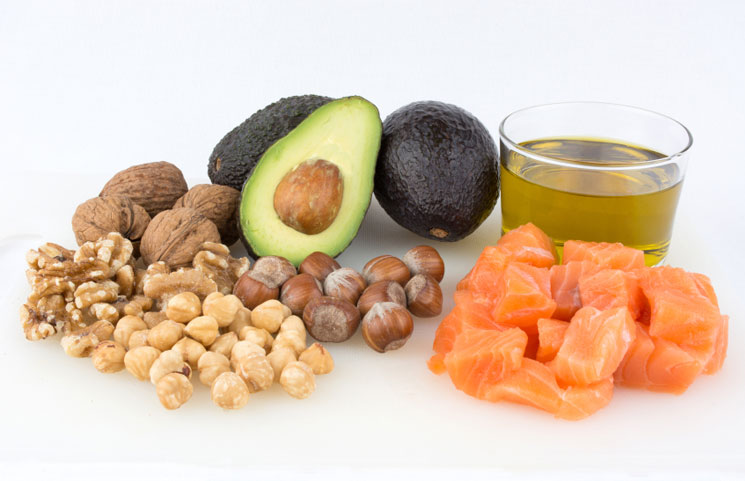 Avoid Saturated Fats
Avoid Saturated Fats
While we’re on the subject of fat content in meals, how can we avoid a discussion about saturated fats? There seems to be an impassioned online debate on the health effects of saturated fats. Many experts disagree on whether or not saturated fats can cause cardiovascular problems.
And while both sides offer valuable arguments, there is one important effect of saturated fats that they almost always ignore. One of the big impacts of saturated fats on the body is that they can significantly lower the levels of nitric oxide production.
 How so? The explanation may be fairly complicated but we’ll do our best to simplify it. Some of the foods rich in saturated fat content can increase the level of fatty acids in the blood plasma. This, in turn, can affect the production of natural nitric acid production. It reduces the capability of the endothelial lining of the blood vessels to produce nitric oxide and, thus,
How so? The explanation may be fairly complicated but we’ll do our best to simplify it. Some of the foods rich in saturated fat content can increase the level of fatty acids in the blood plasma. This, in turn, can affect the production of natural nitric acid production. It reduces the capability of the endothelial lining of the blood vessels to produce nitric oxide and, thus,
impairs the body’s natural capability when it comes to vasodilation.
If you’re thinking about consuming foods rich in saturated fats to improve your body’s cholesterol levels, you might want to think again. In the quest to achieve healthier blood cholesterol concentrations, you can end up with decreased nitric oxide production. On the one hand, you’re finding ways to improve your cardiovascular health. But, on the other hand, you’re moving away from it. And you ultimately end up back to square one. There has got to be a better way, surely.
Besides, you don’t need saturated fats to improve your cholesterol levels. Your body can do that successfully enough on its own. All you need to do is to avoid high cholesterol diets. You need to check your fast food consumption and move towards more home-cooked meals.
A lot of health experts suggest olive oil as the magical solution for preventing cardiovascular diseases. And it may be effective in lowering your blood cholesterol levels. But, at the same time, it can also lead to a reduction in the body’s nitric oxide production levels. Surprisingly, running away from canola oil can cause further damage as canola oil is believed to help nitric oxide production where olive oil is not. Another area where canola oil wins over olive oil is the reduction of inflammation in the body. So, if you are more of a saturated fats person, you might want to rethink your approach.
-

Dark Chocolate Can Help
One of the more surprising effects of dark chocolate is its impact on the production of nitric oxide in the body. Many of the flavonoids present in dark chocolate can help increase the levels of nitric oxide in the body. And this is not just speculation. Various medical studies have been conducted to measure this very effect. One such study geared towards measuring the impact of dark chocolate on the elderly did it by offering 44 individuals 30 grams of dark chocolate which is just a small part of the regular chocolate bar. As a result, those conducted the study recorded lower blood pressure in the participants.
That’s not it. Many of the tribal cultures that regularly consume raw cocoa have noticeably lower rates of hypertension. Their average blood pressure is somewhere around the normal levels and even the effects of aging do not significantly impact the blood pressure of an average consumer of raw cocoa. Processing the cocoa can reduce the flavonoid content of the cocoa. One way to avoid that is through the consumption of raw cocoa.
-
 Consume Foods Rich In Vitamin C
Consume Foods Rich In Vitamin C
It is extremely hard to overstate the health benefits of vitamin C. But most of the scientific literature measuring the impact of vitamin C is geared towards its role in battling skin problems. But that’s not just what vitamin C is good for. One of the lesser known benefits of vitamin C is its effect on the blood circulation.
 Foods rich in vitamin C content can lead to relaxed blood vessels. How so? Vitamin C acts in the body by conserving the existing levels of nitric oxide. It basically protects the NO molecules from destruction by free radicals. As a result, vitamin C is extremely effective when it comes to naturally lowering your blood pressure or relaxing the arteries by preventing stiffness.
Foods rich in vitamin C content can lead to relaxed blood vessels. How so? Vitamin C acts in the body by conserving the existing levels of nitric oxide. It basically protects the NO molecules from destruction by free radicals. As a result, vitamin C is extremely effective when it comes to naturally lowering your blood pressure or relaxing the arteries by preventing stiffness.
One of the best methods of acquiring vitamin C to boost the production of nitric oxide is through garlic. Being rich in vitamin C, garlic can provide all the aforementioned benefits. But it goes even further than that. Garlic is an important source of nitrate as well. So it packs the punch of the nitrate-rich foods. And we already have discussed the benefits of the foods rich in nitrate content can have in terms of boosting the levels of nitric oxide.
Another advantage of garlic is that it is an important source of quercetin. It is an extremely important natural compound when it comes to nitric oxide and its impact warrants further discussion. Apart from garlic, quercetin can be found in foods like citrus fruits, apples, onions, wine, tea, and parsley. The primary advantage of quercetin is that it can reduce vasoconstriction. One of the compounds responsible for causing vasoconstriction includes endothelin-1. How quercetin functions is that it reduces the levels of endothelin-1 in the blood stream. This way it can control some of the effects of quercetin on the activity of the blood vessels.
-
 Exercise More
Exercise More
If you are a bodybuilder or an athlete looking to boost nitric oxide levels in the body, this might be one of the most unhelpful suggestions ever. But it’s an important one. A vast majority of us are neither athletes nor weight trainers. And some of our lifestyle choices include a significantly reduced level of physical activity compared to some of the earlier generations. And our goal is to change that.
 More exercise and increased physical activity is one of those universal principles of good health that apply to almost all situations. Want to reduce weight? Exercise more. Want to stay more active? Go for a walk. It does not just promote physical well-being but also, quite surprisingly, mental health as well. But those are not the only reasons we can’t recommend more exercise enough. More exercise can lead to; you guessed it right, increased nitric oxide levels in the body.
More exercise and increased physical activity is one of those universal principles of good health that apply to almost all situations. Want to reduce weight? Exercise more. Want to stay more active? Go for a walk. It does not just promote physical well-being but also, quite surprisingly, mental health as well. But those are not the only reasons we can’t recommend more exercise enough. More exercise can lead to; you guessed it right, increased nitric oxide levels in the body.
And you don’t even need to join the gym for it. Simple activities like jogging every day can have a noticeable effect. Another helpful activity in terms of boosting the body’s existing NO levels is brisk walking. If you don’t like running, don’t run. Just walk at a higher pace than normal (around 3 mph) for a period of time, each day. Walking alone can increase your baseline levels of nitric oxide in the body. But, overall, that might not be quite enough.
A round of exercise can lead to increased levels of nitric oxide for many hours afterward. But that’s not what you’re after, surely. What you want is a solution for a permanent increase in the body’s nitric oxide production overall. And that’s only possible through sustained physical activity. You have to exercise every day for, at least, more than half an hour.
When you’re considering exercise, don’t just limit your options to activities like walking, running, or cycling. A more wholesome exercise routine for more than half an hour every day can lead to an increase in the body’s overall production of nitric oxide. This, in turn, leads to a decrease in arterial stiffness and blood pressure.
In addition to exercising more in a given day, it’s also important to find more efficient ways of exercising. And this helps boost NO levels naturally for bodybuilders and athletes. The human body is amazing when it comes to reacting to change. As soon as you disturb the status quo, it’ll do all it can to revert back to the equilibrium as soon and effectively as possible. And this natural instinct is extremely beneficial for increased NO levels through exercise.
When you conduct weight training activities, you’re training your muscles to be larger and stronger. Larger muscles require more blood and nutrition. And your body knows that. It’s fantastically adept at catering to the changes in the body brought in by external factors. And, as a response to increased muscle activity and larger muscles, it increases the nitric oxide production so the arteries can dilate and the muscles can receive more blood and, by extension, more oxygen and nutrition than it usually does.
-
 Natural Sunlight Boosts Nitric Oxide Production
Natural Sunlight Boosts Nitric Oxide Production
Who said the way to an increased NO production passes only through the bleak interiors of a gym? You can even sit beside the poolside and feel the sun on your face and your body would get to work on increased nitric oxide activity. Natural sunlight can be quite helpful when it comes to the production of nitric oxide.
Sunlight is a great trigger for the production of nitric oxide. As soon as it touches the skin, it can signal the body to release more nitric oxide in the blood stream. However, this does not give you an excuse to go out and spend long hours under the sun. Doing that can do more harm than good. You can expose yourself to sunburn and other associated skin problems. Also, take care to maintain the balance between physical activity and leisurely time.

-
Laughter Is A Cure
Yes, you read that right. Even a seemingly unrelated activity such as laughter can lead to increased nitric oxide concentration in the blood. Like exercise, the positive effects of regular laughter are not limited to nitric oxide alone.
Many medical studies have measured the impact of laughter on human health. And no study suggests that laughter can be harmful to you. In fact, on the contrary, studies suggest that those individuals who laugh on a regular basis have higher levels of substances like the growth hormone, dopamine, and endorphin in the bloodstream. So, the key to happiness is just laughing more than usual. But that’s not all. The same studies also show that increased laughter can also lead to increased production of nitric oxide in the body.
-
 Chilies To The Rescue
Chilies To The Rescue
You may find it surprising but the key to increased nitric oxide may lie in spicing up your food. What makes chilies so spicy and what gives us the hot sensation is a chemical naturally found in chilies called Capsaicin. And that’s not its only purpose. In addition to giving chilies their characteristic fiery flair, Capsaicin also holds numerous benefits for the human body.
One of those benefits includes its ability to boost the body’s natural rate of metabolism through thermogenesis. It impacts the production of nitric oxide in two important ways: directly and indirectly. On one hand, Capsaicin leads to a direct increase in the nitric oxide production. But, on the other hand, it increases testosterone production which gives us the incentive to exercise more and add more NO through exercise.
-
 Add More Citrulline To Your Diet
Add More Citrulline To Your Diet
You may be wondering ‘where have I heard the word Citrulline before?’ You don’t have to skim through the previous pages to find it. Citrulline, as previously mentioned, is one of the active components of the dietary supplements aimed at increasing the levels of nitric oxide in the body. It not only helps avoid cardiovascular problems and help the fitness community achieve its health goals, but it’s also an active ingredient in many supplements to treat the symptoms of erectile dysfunction.
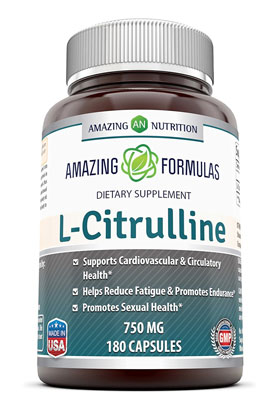 One of the biggest benefits of more Citrulline in your diet is that Citrulline can offer more or less the same benefits of arginine without causing the side effects associated with arginine. How can that be? A brief explanation would be that Citrulline helps those suffering from atherosclerosis when it comes to improving the concentration of nitric oxide in the bloodstream.
One of the biggest benefits of more Citrulline in your diet is that Citrulline can offer more or less the same benefits of arginine without causing the side effects associated with arginine. How can that be? A brief explanation would be that Citrulline helps those suffering from atherosclerosis when it comes to improving the concentration of nitric oxide in the bloodstream.
Again, there’s a lot of scientific research to back up the claims of the advantages of Citrulline. One study, for instance, monitors its effects in older males. Consuming around 5 grams of Citrulline on a daily basis helped the subjects of the study when it came to reducing arterial stiffness without impacting, in any way, on the blood pressure.
Arterial stiffness and blood pressure are not the only areas where the effects of Citrulline have been subjected to examination. Another area where scientific evidence points to the advantages of Citrulline is the treatment of the symptoms of erectile dysfunction. Another study, conducted on senior males, attempts to measure the effects of Citrulline on erectile dysfunction. In this case, the subjects consumed only around 1.5 grams of Citrulline a day. This led to a significant increase in the durations of their erection. Another area where Citrulline had a noticeable impact was the frequency of sexual intercourse, which had increased considerably.
-
 Don’t Forget About Ginseng
Don’t Forget About Ginseng
There’s a good chance you might have heard about Ginseng in relation to treating the symptoms of erectile dysfunction. It’s a Korean herb which is included in many of the supplements and substances geared towards improving sexual performance.
Humans have been using Ginseng for centuries as a cure to a wide range of medical conditions. Erectile dysfunction is among the leading ones in the list. And the way Ginseng targets the symptoms of erectile dysfunctions is through increasing nitric oxide production in the body. However, there’s something you should remember while consuming Ginseng. It can lead to the thinning of the blood. So you need to consult your doctor if you suffer from a condition or on some sort of medications.
 Foods That Naturally Boost The Nitric Oxide Production
Foods That Naturally Boost The Nitric Oxide Production
While on the subject of naturally increasing the nitric oxide production in the body, it’s important to consider some of the foods that can do that. We’ll consider some of the food items here that you should make a part of your diet if increased NO levels is your ultimate goal.
These foods can help you if you’re suffering from existing cardiovascular problems or trying to avoid such problems in the future. They can be an effective natural supplement to your workout routine. They can, in some cases, even combat some of the symptoms of erectile dysfunction. Physicians over the world recommend these foods along with the medication to supplement NO levels naturally in the body.
Some of the NO boosting foods include:
Dark Chocolate And Raw Cocoa
Let’s begin our discussion on familiar territory. We’ve mentioned in the previous chapter that dark chocolate can have a considerable impact when it comes to nitric oxide production. Now, we’ll focus on exactly how it can do that. There are many scientific studies that document and measure the effects of dark chocolate. Some of those effects include a natural boost in the body’s NO production capability as well the regulation of blood pressure.
In addition to some of the aforementioned effects, the cocoa in the dark chocolate can also help address the inflammation of the endothelium or the internal lining of the blood vessels. And it does that by boosting the cells responsible for repairing the endothelial lining. It’s an important step since the endothelium plays a critical role in the production of nitric oxide.
One of the things you should absolutely never forget when it comes to using chocolate to boost the nitric oxide levels in the body is the difference between raw and processed cocoa. A wide majority of the chocolate products available in the market over-process cocoa to the point where the finished product is not even chocolate anymore. Stay away from those products. If possible, stick with dark chocolate or raw cocoa for best results.
 Pomegranate
Pomegranate
Another extremely beneficial food for nitric oxide that we discussed earlier is pomegranate. We mentioned the benefits of pomegranate juice when it came to improving your sexual performance through nitric oxide production. Pomegranate undoubtedly stands as one of the best foods when it comes to naturally boosting nitric oxide production.
And there’s quite a lot of research data to back up the promised effects of pomegranate. It is the perfect food for those suffering from atherosclerosis. Many scientific studies have been conducted to measure the impact of pomegranate. Some of the most notable findings of those studies suggest that pomegranate can reduce the thickness of existing arterial plaque by about 30 percent and boost the naturally occurring testosterone levels by about 22 percent. So whether it’s the treatment of heart conditions or erectile dysfunctions, pomegranate is your food of choice.
 Walnuts
Walnuts
In the previous chapter, we briefly touched upon the importance of walnuts in naturally boosting the nitric oxide levels in the body. But, due to the significance of walnuts, they deserve a dedicated and detailed discussion. One of the biggest advantages of walnuts is that they’re rich in naturally-occurring vitamin E. This can prove to be quite beneficial for the state of your blood vessels and the testosterone levels in the body.
Another beneficial substance found in walnuts is L-Arginine. And, if you remember our earlier discussions, Arginine is one of the two key ingredients in the dietary supplements aimed at boosting nitric oxide production with the other being Citrulline. The presence of Arginine in walnuts makes them an ideal contender for one of the best foods for naturally increasing the nitric oxide levels in the body.
 Spinach
Spinach
In the previous chapter, we stated that one of the best ways of naturally boosting the nitric oxide production is the consumption of foods that are rich in nitrate content. And what better food to consider, here, than spinach? It is said to have one of the highest nitrate levels in all of the plants.
For those suffering from atherosclerosis or other conditions causing arterial plaque, foods like spinach that are rich in nitrate content are the best fits. Spinach can effectively boost the nitrate oxide levels in the bloodstream. The high nitrate content in spinach is broken down into nitrites by the bacteria in our body during the early stages of the digestion process. These nitrites are then further converted into nitric oxide as the food passes down the digestive tract. The nitric oxide can then deal with problems such as arterial plaque and stiffness.
 Beetroot
Beetroot
And while we’re talking about foods rich in nitrate content, how can we not mention beetroot? It can prove to be so effective that many medical professionals ask their patients to consume more beetroot to naturally boost the nitric oxide content in the blood.
Like spinach, beetroot stands high among its other plant relatives by having one of the richest nitrate contents among food items. But that’s not all. Beetroots are also effective when it comes to lowering your estrogen levels naturally through a process in which it acts like a methylator.
 Kale
Kale
Another food which is extremely rich in nitrate content is kale. But that’s not the only reason why it’s so effective in naturally boosting the nitric oxide levels. It also contains the Q10 co-enzyme which is also responsible for naturally boosting nitric oxide.
So, Kale has a kind of a double impact when it comes to raising the NO levels. But that’s not all. It continues to impress on other levels as well. Kale can lead to a general improvement in the health of the blood vessels. It can also naturally boost the testosterone levels in our body.
 Oranges and citrus fruit
Oranges and citrus fruit
One of the nutrients that prove to be instrumental when it comes to the production of natural nitric oxide is vitamin C. Along with its numerous other benefits, vitamin C is also found to be extremely critical when it comes to regulating the levels of blood circulation at healthy levels. But, perhaps, its most memorable attribute here is that it can protect the nitric oxide molecules from free radicals. And it is for this particular reason that vitamin C is so essential in preventing cardiovascular diseases.
And some of the foods that are richest in vitamin C concentration include, but are not limited to, oranges and citrus fruit. A simple way to protect your precious nitric oxide molecules is to drink a glass of orange juice every day.
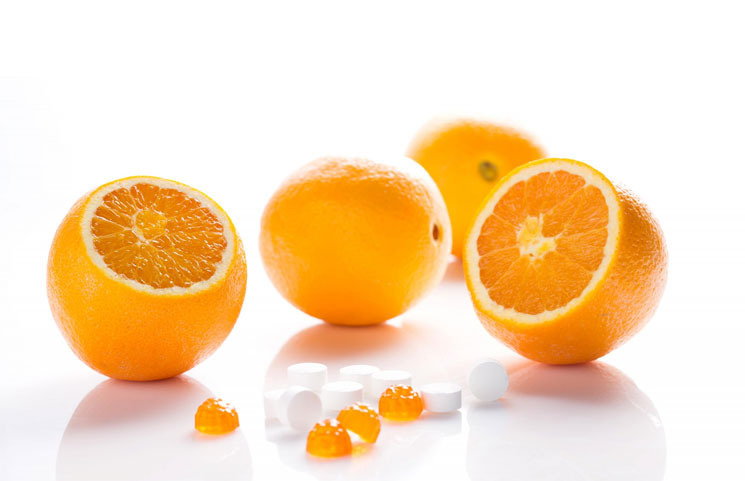 Garlic
Garlic
When it comes to treating the symptoms of erectile dysfunction, garlic is one of the foods that would continue to pop up in our discussion from time to time. Like some of the other foods on the list, the effects of garlic have been subject to a fair amount of research. Some of those research reports suggest that garlic acts in the body through activation of the Nitric Oxide Synthase (NOS) which can create more or less similar physical effects as Viagra or Cialis.
The effects of garlic are not just limited to treating erectile dysfunction, however. One of the studies attempting to measure its effects noted that garlic caused a decreased in the blood pressure in both ranges by a factor of 8 points in those who were suffering from high blood pressure. There aren’t even many blood pressure medications that offer that kind of results. Perhaps it’s unsurprising, then, that even physicians recommend garlic to many of their patients.
 Organ Meat
Organ Meat
Yes, you read that right. Some of what you may consider odd bits and skip at the grocery store can be quite beneficial for you. And animal organs can sometimes be much healthier than a juicy steak. How so?
Well, for starters, the Q10 enzyme that gives kale its characteristic nitric oxide boosting power can be abundantly found in organ meat. The Q10 enzyme becomes primarily responsible for the increase the production of nitric oxide in the body.
 Onions
Onions
It would be extremely hard to overstate the importance and the benefits of having a healthy amount of onions in your diet. In more than one studies, onions have shown to increase the nitric oxide levels in the body. Additionally, they’re also involved in boosting testosterone levels naturally in the body.
But the benefits of onions don’t end here. They’re also an effective source of vitamin C which, similar to oranges, is responsible for the protection of preexisting nitric oxide molecules. Another compound, present in onions, responsible for boosting the NO levels is known as quercetin.
 Brown rice
Brown rice
The health benefits of rice are widely well-documented. There has been a lot of scientific research on how regular consumption of rice can have a positive impact on our health. But one of the more understudied and underrepresented food items belonging to the same family is the brown rice.
But there are some studies that suggest a link between the consumption of brown rice and an increase in nitric oxide levels in the body. Other studies suggest that brown rice also plays a role in reducing arterial stiffness to relax arterial walls and improve the circulation of blood in the body.
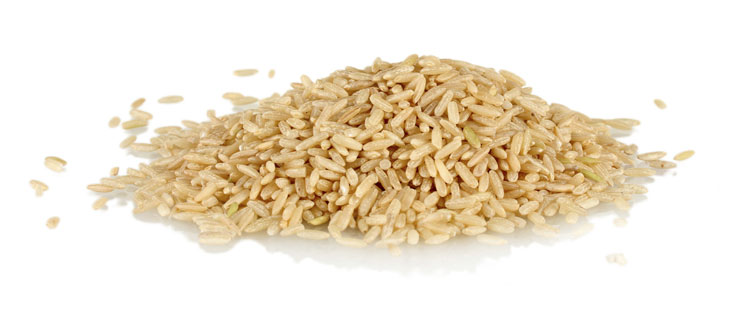 Black Tea
Black Tea
All the drinks that are high in caffeine content have the opposite effect of what nitric oxide is supposed to do. Unlike nitric oxide, caffeine is a vasoconstrictor in nature. This means that it constricts the blood vessels rather than dilate them as is the effect of nitric oxide.
Keeping the aforementioned information in mind, black tea turns out to be quite an unusual beverage. Being a form of tea, it is naturally high in caffeine content on one hand. On the other hand, however, it occupies a key position among the food items that increase nitric oxide.
So, instead of vasoconstriction, the effect black tea has is quite the opposite. It relaxes the blood vessels and reduces arterial stiffness by boosting the production of nitric oxide in the body. So the more black tea you consume, the better your blood circulation can be.
 Peanut Butter
Peanut Butter
Bodybuilders and weight trainers would be no strangers to the wonders of peanut butter. It’s the perfect way to gain those elusive calories. Whether it’s a protein shake or a sandwich, peanut butter is the staple of a high-calorie diet.
But there’s another way peanut butter can be extremely beneficial if you hit the gym on a daily basis. The peanuts in the peanut butter are extremely rich in arginine. And, as we’ve seen time and time again, arginine is associated with nitric oxide production. Greater levels of nitric oxide in the body can, in turn, significantly improve the relaxation and recovery of the muscle tissue and prevent fatigue during workouts.
It should go without saying that, when you’re going for peanut butter, you should choose the one which is organic and natural. Peanut butter products with processed peanuts are no good here. The peanuts can lose some of their natural essence through processing.
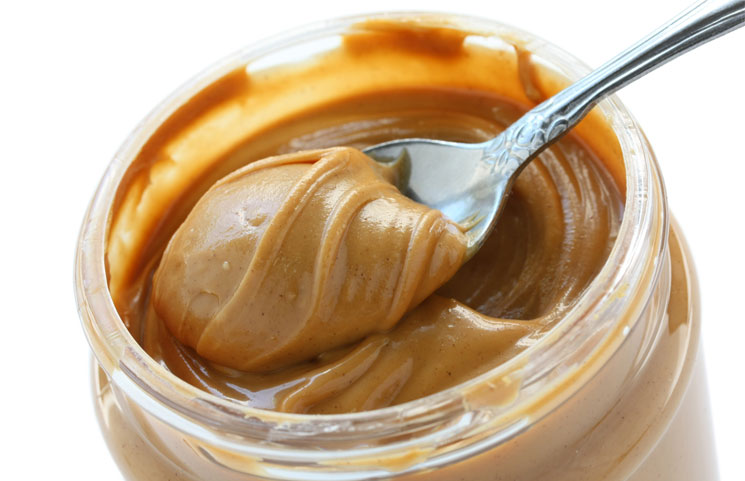 Nitric Oxide and Diabetes
Nitric Oxide and Diabetes
When it comes to nitric oxide, one of the areas which continuing to capture the attention of the scientific community is the link between Nitric Oxide and Diabetes. Research is ongoing and, as new evidence continues to mount, we’re in a much better position to analyze the link between the two. And while the specifics of the relationship will continue to be defined through ongoing scientific efforts, there’s plenty that we know so far. Here is some of what we know about the link between nitric oxide and diabetes.
Nitric Oxide Impairment In Diabetic Patients
Research suggests that patients with Type I and Type II diabetes both suffer from nitric oxide impairment. This suggests that there is a link between the impairment of nitric oxide production in the body and diabetes. Indeed, patients with both types of diabetes have a reduced ability to produce nitric oxide through the aforementioned L-arginine. What does it mean? What does it imply? Let’s explore these questions further.
There are several factors that can influence the production of nitric oxide in the body.
 ADMA And Reduced Kidney Function
ADMA And Reduced Kidney Function
One of them is known as asymmetrical dimethyl arginine (ADMA). When L-arginine is metabolized, it produces ADMA in limited amounts. The job of the ADMA is to inhibit the production of an enzyme nitric oxide synthase (NOS) which, as the name suggests, is involved in the production of nitric oxide in the body. Under perfectly healthy conditions, our body finds ways to eliminate ADMA through urine, limiting its ability to cause damage.
However, one of the effects of Type II diabetes is reduced kidney function. This can also be caused by aging. In fact, a sizeable number of Americans over the age of 65 suffer from Type II diabetes. Sometimes diabetes also accelerates kidney dysfunction. All of these factors contribute to the body’s reduced ability to eliminate ADMA. As a result, ADMA continues to be prevalent in the blood stream and inhibits the production and function of NOS. This, in turn, limits or reduces the production of nitric oxide in the body.
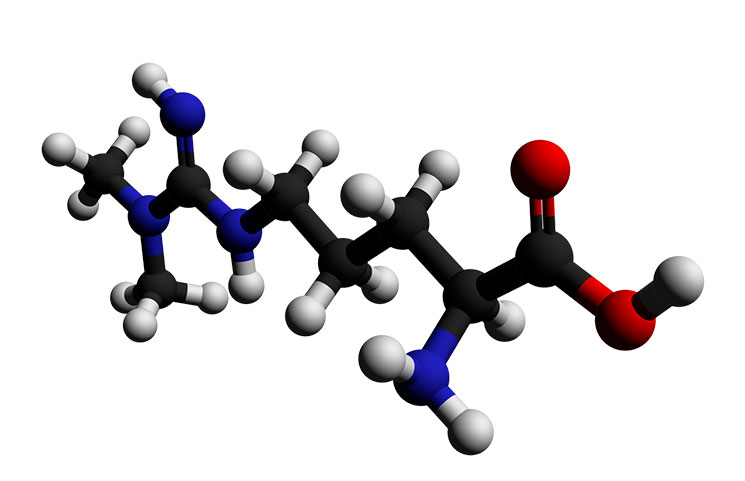 NOS And Alkaline Conditions
NOS And Alkaline Conditions
And when it comes to NOS, the body’s pH conditions are critical. For optimal functioning, NOS requires stable pH conditions which should lean towards slightly alkaline. These conditions are hard to maintain when someone is suffering from diabetes. Some of the process caused by diabetes, including ketoacidosis and glycolysis, transform the pH conditions to be acidic. This also leads to a reduced production of nitric oxide.
Lack Of Adequate Oxygen Supply
Diabetic patients can also suffer from reduced blood circulation. Since blood circulation is the means for transporting oxygen, the oxygen supply is hampered as a result. This is not good when it comes to the production of nitric oxide. Since much of nitric production is dependent on an adequate oxygen supply, many diabetic patients experience nitric oxide impairment.
High Glucose Levels
One of the characteristic signs of diabetes is elevated levels of glucose in the body. Some of the excess glucose is incorporated into the hemoglobin molecule to create what’s known as glycosylated hemoglobin.
One of the effects of such an association is that glycosylated hemoglobin prevents the release of nitric oxide by binding it tightly with the hemoglobin molecule. So, even though the body forms nitric oxide, it doesn’t have the ability to easily release it to relax muscles or cause vasodilation.
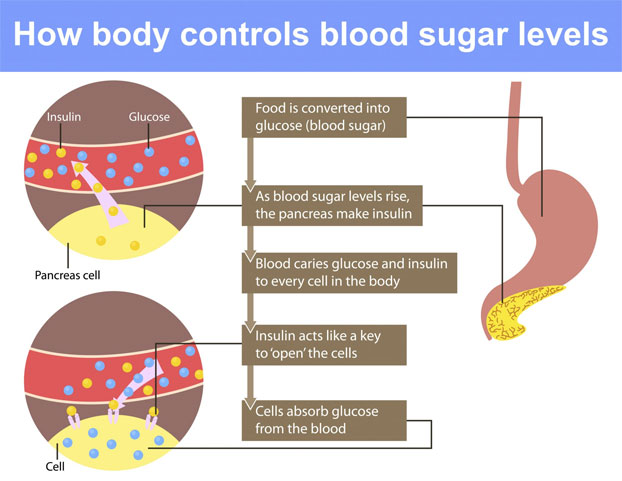 The Health Risks Of Nitric Oxide Impairment
The Health Risks Of Nitric Oxide Impairment
We’ve seen how diabetes can impact the production and distribution of nitric oxide in the body. Some of the effects of diabetes such as the reduced kidney function, reduced oxygen supply, and changing pH conditions can hamper the production of nitric oxide. If the body still, somehow, manages to produce adequate levels of nitric oxide, the elevated glucose levels can hamper its release and subsequent benefits.
But one question still remains. How can all that directly affect the health of diabetic patients?
And the answer is not comforting.
When diabetes hampers the body’s capability to produce or release nitric oxide, it has a direct impact on the blood circulation. As nitric oxide is a vasodilating agent and stimulates the relaxation of muscles and blood vessels, those functions are somewhat impaired in diabetic patients. This can lead to several problems, the biggest of which is the increased probability of developing ulcers.
Another effect of diabetes is that it can reduce the body’s ability to metabolize nitric oxide. This, research suggests, can cause nerve damage in many patients suffering from diabetes.
Diabetic patients also lose some of their ability to reduce pain. This is also linked to the low production of nitric oxide. We’ve discussed how low NO levels can reduce the regular levels of blood circulation. This can lead to a disturbance in the membrane potential and a decrease in some of the stimuli involved in the perception of pain.
Not only do the diabetic patients lose the ability to reduce pain, some of the effects of low nitric oxide levels can cause even more pain. Since the blood circulation is limited, diabetic patients can often experience swelling in their fingers and toes. The swelling exerts pressures on the nerves. This, in turn, causes more pain.
In short, it’s not fun to be a diabetic and suffer from low levels of nitric oxide.
Can Nitric Oxide Cure Diabetes?
One of the areas under intense scientific scrutiny is how can we lessen some of the effects of diabetes through increasing the levels of nitric oxide in the body. The primary area scientists are focusing on is the role of nitric oxide in cell repair.
Researchers from the University of Florida have centered their research on the activity of a particular group of cells. This group of cells acts as the body’s natural maintenance force. They have the responsibility of traveling throughout the body and repairing the damage in blood vessels.
In the patients suffering from diabetes, these cells become a lot more rigid. As a result, the maintenance function is hampered, which adds to the blood vessel related complications. However, the University of Florida research has enabled scientists to reduce the rigidity of the cells. And, you guessed it right, it involves nitric oxide.
Before moving on to how nitric oxide can reduce cell damage among diabetic patients, let’s first discuss the dynamics of cell damage in diabetic patients. Only by understanding how cells are adversely affected by diabetes can we gain an insight into how nitric oxide can repair said damage.
 Cell Damage in Diabetic Patients
Cell Damage in Diabetic Patients
Many of the more pronounced effects of diabetes including stroke, cardiovascular problems, kidney failure, and blindness are caused when blood vessels suffer from damage. And when blood vessels suffer from damage, it can cause the accumulation of deposits of fat in the arteries. Another effect of cell damage in the blood vessels is the growth of new capillaries in certain sensitive areas, such as the eye.
The key to understanding these problems is gaining an insight into what happens at the molecular level. We have to ask ourselves about the changes that occur at that level, changes that can cause some of the more serious physiological problems as a result of diabetes. Why do diabetic patients develop certain complications? How can diabetes give rise to other diseases? The answers to all these questions can be discovered at the molecular level.
The group of cells responsible for overseeing the body’s maintenance processes is produced mainly in the bone marrow. It’s the body’s natural response to addressing injury in the blood vessels. The system works well under healthy conditions but fails in diabetic patients. And the reason is that the cells don’t carry out the functions they’re supposed to perform.
Where Does Nitric Oxide Step in?
Much of the University of Florida research was geared at finding ways to address the cell damage issue. To that aim, they extracted the group of cells responsible for carrying out the repair function from the blood stream.
They obtained blood samples from patients suffering from diabetes or kidney disease. Those samples were then taken to the lab to be examined. As expected, the repair cells obtained from those patients were unable to function normally. However, adding nitric oxide to the blood sample dramatically improved the conditions. Some of the rigidity in the cells was lost and they were able to perform their functions more effectively.
Under normal circumstances, the regular functioning of the repair cells shouldn’t be a problem at all. When nitric oxide is released at regular levels, it plays a huge role in the transport of the repair cells, relaxation of the blood vessels, and the adequate oxygen supply. But all of that is not possible in patients suffering from diabetes since, as we’ve seen above, the nitric oxide production is hampered.
When the University of Florida researchers added nitric oxide to the blood samples, they observed that increased NO levels had an effect on the skeleton of the cell. The change in the structure enhanced their ability to move and migrate across the blood stream. This, in turn, increased their effectiveness when it came to repairing the endothelial surface and preventing atherosclerosis.
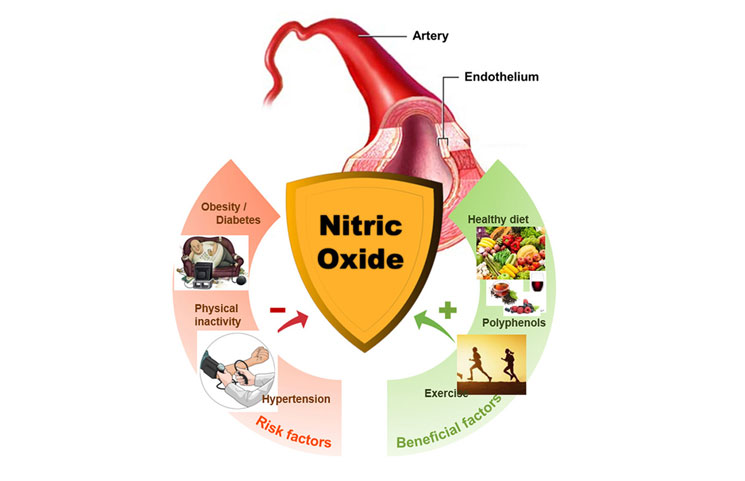 A Step Towards the Cure?
A Step Towards the Cure?
The University of Florida research is a huge step towards developing the cure for diabetes. And it should not come as a surprise that the cure could involve nitric oxide. This can increase the mobility of the cells and increase the efficiency of repair cells.
The researchers described two critical ways through which some of the effects of diabetes can be cured. The first is through creating and prescribing certain medications that can increase the levels of nitric oxide in the cells. The second way is through collecting some of the repair cells from diabetic patients, treating them with nitric oxide under lab conditions, and introducing the cells back to the patient’s bloodstream in order to improve the movement of the cells and the effectiveness of the repair functions.
This can mean a revolution for the treatment of the patients with diabetes.
Nitric Oxide [no2] Conclusion
The health benefits of nitric oxide in the body are numerous. And as more scientific research continues to pour we’re discovering more about what this incredible molecule can accomplish. From dealing with cardiovascular problems to helping bodybuilders and from treating erectile dysfunction to potentially curing diabetes, it’s truly astounding how much nitric oxide can achieve and how little is known about it.
It only goes to show how big of an impact seemingly simple activities, like stepping out into the sun, can have. Knowing some of the benefits of nitric oxide can help you achieve your health goals, it can boost your confidence in bed, and it can help you push your body more towards achieving the perfect shape.
One part nitrogen and one part oxygen—a simple solution to an array of complex problems.
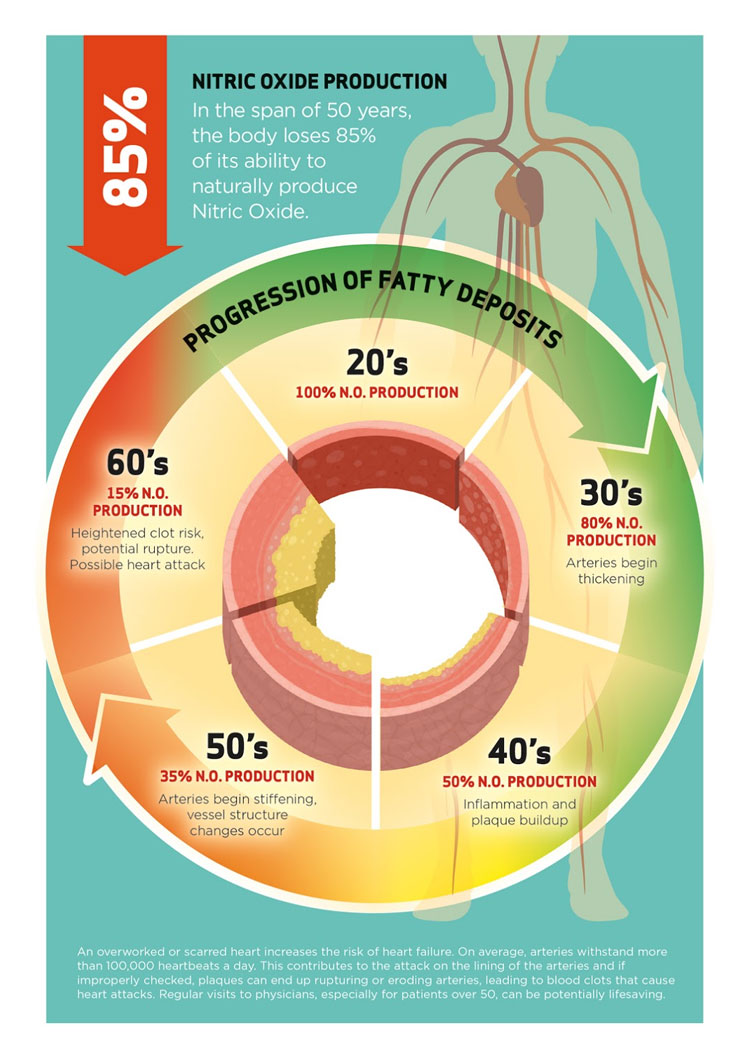










I love all the benefits of Nitric Oxide! I take and it works really well for me